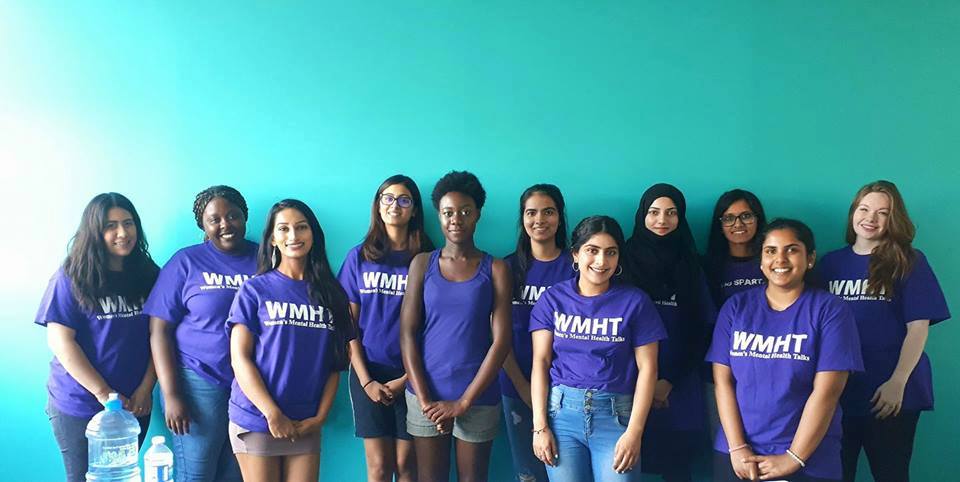Jodie Vanderslot | Health Editor
Featured image: WHMT discusses women’s mental health through an intersectional lens. | Courtesy of WMHT
Women are meant to build each other up, not tear each other down. Women’s Mental Health Talks (WMHT) is a peer support group at York dedicated to women to address some of the major challenges and experiences women share. The club was created with the hopes of helping women obtain mental, emotional, and social support in a safe, confidential, and accepting environment on campus. The goals of the club include self-empowerment, creating and sharing a safe space, inspiring and uplifting, and increasing awareness in barriers and coping methods. Through sharing personal stories and experiences, women are able to act as a source of inspiration, deriving strength from one another.
WMHT was ratified in August 2016 with an executive team of about 15 members, all with different positions, such as President and Vice-President, Communication Directors, Discussion Directors, Events Coordinators, Student Outreach volunteers, and Article Writers.
“All the women on our team are smart, kind, hard-working, driven, and passionate about raising awareness about women’s mental health and helping students know that they are not alone,” says Shalyn Isaacs, president and founder of WMHT and fourth-year Psychology major.
The group holds meetings and open discussions on a bi-weekly basis. Members come together to create a dialogue and have their stories, perspectives, and strategies heard. A few of the topics for open discussion meetings thus far have included maintaining healthy relationships, sexual health, self-care, coping with anxiety and depression, and self-worth and confidence.
“I thought that I would love to share my experiences, insights, and coping strategies with other women so that I would be able to help those who may be struggling with similar problems that I had overcome. However, I also wanted to hear the stories and coping strategies that other women use,” says Isaacs.
WMHT has a wide discussion forum ranging from societal expectations to family, the workplace, mental health, body image, unhealthy relationships, and building self-esteem. They are a group that is largely focused on support and encouragement, and its members are there to help you with whatever you may be going through, past or present. It is an open forum, designed to prompt individuals to share and reach out.
“These are obviously very broad topics,” says Isaacs, “but that is because it gives members the opportunity to bring their numerous, individualized experiences and perspectives to these meetings to share with each other. It really is a wonderful space for women to learn from each other, feel less alone, empower and support women around them in the group, and to gain strategies to heal themselves.”
“Being a part of this club has allowed me to grow as a person and it has made me fearless, as I know that I have a safe space to share my experience with like-minded individuals. This club has given me a broad range of skills that help me become a better version of myself everyday,” says Samia Chowdhury, communications director for WMHT.
There are certain situations and dilemmas that impact women more often than men, including sexism, domestic violence, sexual assault, and unrealistic beauty standards. WMHT aims to address the specific challenges and barriers that are prevalent in the lives of women.
While Isaacs was volunteering as a research assistant in Dr. Alexandra Rutherford’s Psychology’s Feminist Voices lab, she realized that there are certain perspectives and challenges that are unique to women from different backgrounds, and that these intersectional differences need to be addressed when we are trying to understand the lives of all kinds of women.
WMHT employs an intersectional approach, meaning their intention is to highlight the multiple factors that shape one’s experience. The experiences a woman may have are completely unique to her; these experiences are shaped through identity, such as race, class, socioeconomic status, or privilege or lack thereof. WMHT recognizes that there are parallels that exist among women; it is through these shared experiences that we are able to support and empower each other.
“Whenever women talk to us about how our support groups help them, or how comforted they feel after attending the support group sessions—I know 100 per cent that myself and the WMHT team did the right thing by starting this club. Even though it is a small organization at York, it makes a positive difference in the mental health and wellbeing of women on campus and I am so happy about that.”
Everyone is going through something. Whether or not they wish to share their story is up to them, but they should never feel alone. WMHT is a safe place to discuss personal problems and provide and receive support.
Sexuality and sexual health is the topic for the next open discussion meeting, set to take place on December 5 from 6 to 8 p.m. in room 311C in the Student Centre.
“Sometimes, members walk in with their shoulders slumped and feeling upset or anxious, and leave either laughing, smiling, or feeling a bit lighter.”
Brittany Pasher is one of the Discussion Directors for WHMT and adds: “WMHT has allowed myself, and every member, to have the space to embrace vulnerability and use it as a powerful tool—to inspire and support others. Each meeting leaves me feeling invigorated, and so thankful that I can be a part of this community.”
You can learn more about WHMT by following them on Facebook and Instagram @WMHTYORKU, or by sending them an email at womensmentalhealthtalks@gmail.com.




